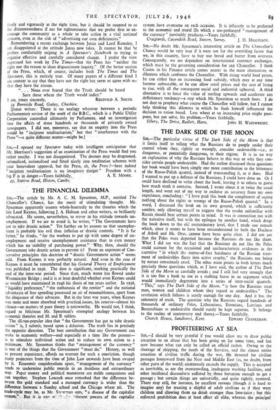THE FREEDOM OF THE PRESS
Stit,—The general public defence of the proposal for a Royal Commission on the British Press can wait until the Government has given a decision ; but some of the comments of Janus on the subject call for prompt notice. First, it seems strange to me that virtually the same instrument as he approves when the Government is pressed to apply it to the B.B.C. becomes " incipient totalitarianism " at the first hint that the Government might direct it towards the Press. As one of the small group of Manchester journalists with whom this Royal Commission idea originated, and the delegate chosen to move the resolution on behalf of the Manchester branch at the annual delegate meeting of the National Union of Journalists, may I assure you that the need to guard against any possible totalitarian treatment of the Press has always been as much in my mind as the undoubted evils of the present position? A Royal Commission seems to me an instrument of freedom rather than of totalitarianism. Like the Government, I think both the B.B.C. and the Press can rightly be subjected to close enquiry, but of the two I think the Press needs this kind of enquiry the more. Whereas the B.B.C. can be criticised in the Press, there is no similarly effective platform of criticism of newspapers and Iieriodicals.
Janus also suggests that by asking for a Royal Commission we are " seeking Government assistance in a matter in which journalists may be supposed to be capable of looking after their own interests," and making "patent confession of weakness." If this refers to journalists as individuals, it will be obvious to anyone who keeps in mind the relative strength of employer and employed in any industry that it is nonsense. The desire to strengthen the diminishing freedom and influence of conscientious journalists in their own profession is part of the motive for the present campaign. If Janus means the National Union of Jour- nalists, the answer is that perhaps in our necessary preoccupation hitherto with our own economic standards we have been slow in taking action on the broad public aspects -of our profession, but we are in a mood to do so now. We are not without our own ideas, which we shall express freely and vigorously at the right time, but it should be counted to us for disinterestedness if not for righteousness that we prefer first to en- courage the community as a whole to take action in a vital national concern, even at the risk of "advertising our own deficiencies."
Remembering a recent exchange between Janus and Lord Kemsley, I am disappointed at the attitude Janus now takes. It cannot be that he prefers comfortably sniping in A Spectator's Notebook to trying to organise effective and carefully considered change. I prefer the view expressed last week by The Times—that the Press has " neither the right nor the reason to shun dispassionate inquiry." Of the better section of the Press, which, of course, includes both The Times and The Spectator, this is entirely true. Of many papers of a different kind I am content to say that they have not the right but..seem to agree with me that they have the reason.
" . . . None ever feared that the Truth should be heard Save those whom the Truth would indict."
I am, yours sincerely, REGINALD A. SMITH. 34 Burnside Road, Galley, Cheshire.
[Janus writes: There is no analogy whatever between a periodic Parliamentary review of the work of the B.B.C., which is a Public Utility Corporation controlled ultimately by Parliament, and an investigation into the affairs of shine hundreds or thousands of privately owned newspapers. I did not, moreover, say that an enquiry into the Press would be "incipient totalitarianism," but that "interference with the Press "—a nuke different matter—might be.]































 Previous page
Previous page